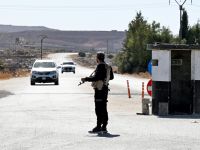On Wednesday, defense lawyers expressed fear that some of the 94 alleged Islamic militants on trial in Egypt would be imprisoned for 15 years with hard labor, but discharged previous concerns they would get the death penalty, according to AFP.
"I don't expect death sentences, but even if the punishment is not as severe, it will still be very hard because it will not be backed by evidence," lawyer Mamduh Ismail told the Egyptian News Agency at the military court, located north of Egypt’s capital.
Last month, the prosecutor called for the "maximum penalty" for the 94 men, including 7 who are fugitives, and who are implicated in plotting a terror campaign to topple Egypt's secular government.
Defense lawyers said at the time this could indicate the death penalty for the 8 alleged leaders of the radical Islamist group Al-Waad [The Promise].
"If this trial had been handled by a civilian court, it would have been thrown out the first day," Negad al-Borai, another defense lawyer, said.
"In this case, the only one to blame is the one who brought it before a military court," he pointed out.
During a short recess in the session, families of the accused hurried over to speak to their loved ones held in the cages in the courtroom, having seen little of them because prison visits are banned.
In a moving gesture, the judge allowed the 4-year-old daughter of one of the accused to enter the cage and sit on her father's lap for the remainder of the hearing. He could not stop kissing her.
Hafez Abu Saeda, another lawyer and secretary general of the Egyptian Human Rights Organization, pointed to "large shortcomings in the trial."
These included the judge's refusal to hear "witnesses for the defense" and to give the religious authorities books that were taken from the accused and termed as "work inciting terrorism."
Officers from Egypt's State Security Investigations have told the court the defendants confessed that the group discussed the assassinations of Egyptian President Hosni Mubarak and leading religious and cultural officials, as well as attacks on strategic buildings such as Cairo's Television center, court sources stated last month.
The prosecution has also said the group was involved in collecting funds for Islamic militant groups abroad, from whom they would learn how to carry out terrorist acts in preparation for an attempt to seize power.
The defendants include three from the Russian republic of Dagestan, another from Yemen, a dual US-Egyptian national and holders of German and Dutch passports.
Defense lawyers have expressed the group may have raised funds for Islamic causes abroad, however, was not likely to have seriously considered committing any act of violence inside Egypt.
Family members of the accused have claimed that the officers who testified before the court regarding the defendants' arrests were not the same officers who made the arrests in May.
The prosecution's case has been based largely on confessions reportedly taken from the defendants by the arresting officers. Several of the defendants have alleged that they were subjected to such means as torture.
The case, which opened November 18, was adjourned until February 19. (Albawaba.com)
© 2002 Al Bawaba (www.albawaba.com)







